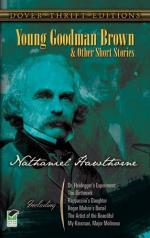|
This section contains 3,050 words (approx. 11 pages at 300 words per page) |

|
SOURCE: "Narrative Structure and Theme in 'Young Goodman Brown'," in The Journal of Narrative Technique, Vol. 12, No. 3, Fall, 1982, pp. 221-28.
In the following essay, Hostetler investigates how conflict between the points of view of the title character and the narrator of "Young Goodman Brown" creates an ironic tension from which Hawthorne "develops his criticism of Brown's lack of awareness of the controlling power of the mind."
One of Nathaniel Hawthorne's major themes concerns conscious awareness of the reality which the mind imposes on external objects. Hawthorne's characters are repeatedly confronted by the need to establish the relationship between their imaginations and the external world. Their ability to make the epistemological distinctions between the products of their mental processes and their sense impressions of the external world frequently governs their ability to develop a sound moral relationship with other people.
"Young Goodman Brown" illustrates especially well the fatal consequences...
|
This section contains 3,050 words (approx. 11 pages at 300 words per page) |

|


